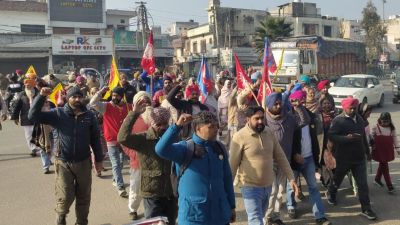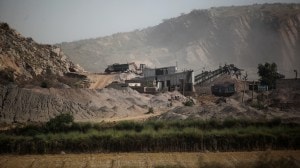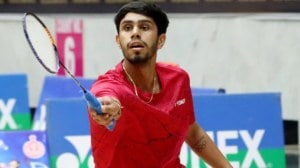A view from the water
Quegdevelim north GoaWhat better way to celebrate New Year8217;s Eve than in Goa? The western coast, the safer coast, where fairy lights ...

Quegdevelim north Goa
What better way to celebrate New Year8217;s Eve than in Goa? The western coast, the safer coast, where fairy lights still glitter on beach shacks while on the opposite side of the peninsula, the hydra-headed monster that rose out of the sea ten days ago continues its barbaric feast.
Two features among many of the tsunami have emerged. First, the political sideshow. At last the elegant Kapil Sibal has ascended to some level of relevance. And also revealed that he has foot-in-mouth disease. The minister for that vague portfolio known as Ocean Development burst mercilessly into the national media only to place himself at loggerheads with it, insisting that he had been misquoted by newspaper A and misinterpreted by TV channel B, at a time when he needed to rise to the stature of calm commander.
Yet there is another far more important feature of the tsunami. Whether in the tsunami-hit towns of Nagapattinam and Cuddalore or off the rollicking coast of Goa, one quiet nocturnal entity stands as the main metaphor of the hardship and precarious vulnerability of the seemingly happy-go-lucky pleasures of the coast. And this is the traditional fisherman. At the daily mercy of the Vast Blue, often living in shacks without land, denied the social respectability of the land-owning peasant, desperate for the daily catch, the farmers of the ocean have to contend with the fierce competition from mechanised trawlers, their own low caste status and a flimsy marginal identity. The huge numbers of fishermen killed in Nagapattinam show to what extent the fisherman remains one of the orphans of the modern economy.
In 1979, the efforts of Thomas Kocherry saw the emergence of the National Fish Workers Forum. As a result of Kocherry8217;s efforts states like Kerala passed the Kerala Marine Fishing Act in 1980. Yet in Goa itself the statistics tell a grim story. The population classified as fishermen numbers 30,225 in Goa. But of this only 11,944 are able to earn a living through fishing. Others have had to diversify into trade or emigrate to the Gulf. There were 1,134 mechanised boats in Goa in 2001. The others, the overwhelming majority are classified as motorised wooden country crafts with an outboard motor or non-motorised country crafts, even canoes. Imagine the fate of a canoe confronted with a 8-metre wave.
Fishing suffers from a lack of regulation although an act passed in Goa places a 5-km zonal ban on trawlers. Yet there are few limits placed on the uncontrollable increase in fishing vessels. And for decades no government in Goa even dreamt of insurance for fishermen. In fact, the coastline is less about the fishing community8217;s needs, but more about how it can be exploited for real estate and tourism. The salt water resort exists for the short-term pleasures of the tourist, not for the livelihood of those who inhabit it all year round. Despite the regulations on construction, the coastline is dotted with newly constructed tourist villas. Fishing co-operatives are generally non-existent and unlike rich farmers, subsidies are not available either for kerosene or petrol. Fisherfolk families are busy ones, husbands with the catch, wives with the vending, often leaving children unattended. The 8220;dance of fury8221; ten days ago has been marked by the mass death of children.
In Quegdevelim, when the blackness of night begins to be touched by a tentative smudge of grey, Allie Rodrigues and his son Antony set out in their boat, Mila, towards the sea. Allie Rodrigues is a traditional fisherman, renting a wooden canoe with an outboard motor. He and his son Antony go out fishing every night, either at 10pm or at 4am, returning only in the late morning. They aim to catch fish worth Rs 1,500 at least every day. Out of this, Allie pays 50 per cent to the boat owner and spends another Rs 100-200 a day on petrol and kerosene for the motor. The filmy nylon nets which he and his son haul in every dawn are painstakingly repaired in the afternoon. Shy Antony is planning to work in the Gulf for a few years so he can save enough money to buy his father a trawler.
A traditional fisherman has no chance against trawler owners, who are often local money-lenders or businessmen or simply foreign-owned. Trawlers lift away the best fish, leaving Allie and Antony to sit in their wooden canoe in the dark sea every night, waiting for their net to fill. Sometimes they invite a curious visitor like your columnist to ride with them.
The ocean at night is still but somehow tumultuous. Waves lap against the Mila. There is a sense of a yawning universe under the water, teeming with life and history. On the night of the tsunami Allie felt a strange current. The tide, which normally takes six hours to flood, came flooding in minutes after it had ebbed. A few months ago, a huge wave knocked his boat over and he and his son spent almost the whole day swimming. A staring crowd gathered on the shore as the two swam from morning until late afternoon, when a helicopter clattered to the rescue.
Allie says he8217;s the smallest man in Goa, yet the scale of existence becomes gigantic on the Mila. The lights on the beach motels look ridiculously small from so far away at sea. Tiny human irrelevancies perched on the edge of acres of inky black water. The sea is a giant reclining god. If the god merely lifted his toes, avalanches of water would go skating to the shore and flood out all those little pleasure spots.
What little human virtues and vices can ever compare with this amoral magnificence? The waves are not compassionate, the sea is not sympathetic; instead the ocean is gargantuan, elemental, without any rational meaning whatsoever. Alone, Allie and his son sit framed against this beautiful malevolence. Their net is filling slowly with mackerels and sardines, the waves rock the Mila this way and that and a sudden gush of wind blows back Allie8217;s hair. He is elderly, tough, descended from generations of fisherfolk. Some 30 per cent of Goa8217;s fishermen are Phadtes and Taris, 70 per cent are Rodrigues and D8217;Souza, mostly classified under the Kharvi or OBC category. As a result of Goan laws several fishermen own land but this is an exception to other parts of India.
Dawn begins to break. Soon tourists will wend their way to the shacks for fresh fried fish. Allie and Antony are happy. Their nets are heavy. Tonight they have emerged victorious against the ocean. But the ocean is only biding its time.
- 01
- 02
- 03
- 04
- 05































